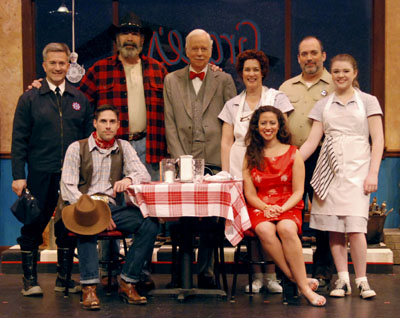| washingtonpost.com
Inge's 'Bus Stop' A Worthy Vehicle For Reston Players
By Michael Toscano
Special to The Washington
Post
Thursday, May
15, 2008; Page VA19
It might be spring elsewhere, but it's a snowy winter night onstage for the Reston
Community Players, where a group of bus passengers is stranded in a remote Kansas
diner, circa 1955.
The roadside refuge becomes the setting for a turbulent night of emotional upheaval,
confrontation and accommodation. This is William Inge's "Bus Stop," the play upon
which a movie and TV series were based.
The Reston troupe's generally agile production demonstrates why the play has endured,
even as Inge's reputation has faded. Despite flaws in this performance, the play
retains the power to explore love in several dimensions.
For a time in the 1950s, it appeared that Inge might be considered, alongside
Tennessee Williams and Arthur Miller, as a giant of postwar U.S. theater. He had
four Broadway hits: "Bus Stop," "Come Back, Little Sheba," "The Dark at the Top
of the Stairs" and the Pulitzer Prize-winning "Picnic."
But Inge never again achieved those heights. "Bus Stop," a drama with comedic
elements, was his biggest hit and arguably his best work. But it was Marilyn Monroe
in the film version who gave the movie classic status. She turned in her best
performance in the role of a vulnerable bar girl who thinks she's a talented
chanteuse. Even without Monroe, Reston's "Bus Stop" is an enjoyable place to
linger.
Ozarks-bred Cherie (Carla Francischetti) has just deserted the dive where men
watched her, rather than listening to her sing. She hoped to make it to Hollywood
but is being forced to take the bus to Montana by Bo (John Golden), a brawny
rodeo rider.
Bo wants Cherie to marry him and live on his farm; he doesn't care that she wants
to do neither and is loudly protesting. Also on board is Virgil (Jon Roberts),
Bo's mellow, guitar-playing buddy; and Dr. Lyman (Philip Baedecker), an aging,
alcoholic professor who, it turns out, likes young women.
A winter storm forces the travelers and driver Carl (Chris Robichaux) into Grace's
Diner. They wait for dawn, served by the brassy proprietor, Grace (Jessie Roberts),
and young waitress, Elma (Kelsey Kolbe). As the hours pass, Bo bullies Cherie,
Dr. Lyman subtly weaves a spell over Elma, and Grace and Carl make a connection
and disappear into her private apartment. In the course of the evening, the
sheriff, Will (David Segal), has to restrain roughneck Bo and otherwise manage
the long night's journey into day.
Director Chuck Dluhy seems of two minds about this play. The first act bristles
with high energy, and some performances border on strident. Roberts's Grace is
so sitcom-shrill we expect her to shout "Kiss mah grits" at her customers. But
the second act settles into more natural rhythms, and the excesses largely
dissipate.
But Francischetti's work as inept singer Cherie remains problematic. Rather than
emphasizing the vulnerability the character retains despite her rough life and
considerable experience with men, Francischetti plays her as hard-edged harpy,
with a screeching voice and overdone hillbilly accent. That undermines her
storyline with Bo, as it's challenging to see her as victim when she's as
overbearing as her uncouth suitor. It also weakens Golden's work peeling away the
layers to reveal the cowboy's true nature.
The best moments come between impressionable waitress Elma and the old professor.
Both Kolbe and the dapper Baedecker are pitch-perfect. Kolbe's naturalistic
performance of the eager and naive girl complements Baedecker's skillful transition
from Lyman's air of detached amusement to his bitter realization of the depths
of his dissipation.
Kolbe also shares Francischetti's most effective moments, as their characters
share quiet conversation in Act 2. Francischetti finally drops the tough facade
and allows us to see the wounded, vulnerable creature Cherie really is.
Maggie Modig's meticulously detailed set, complete with falling snow, deserves
special mention. Its realism complements and supports Inge's straightforward
exploration of the differences between sex and romance, lust and tenderness.
|

